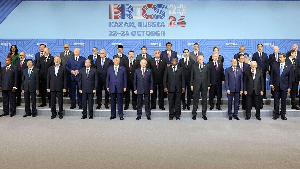Today June 12 is World Day Against Child Labour. Whilst the theme for the day this year is "Harvesting the future - agriculture without child labour" the focus is essentially on all the Worse Forms of Child Labour (WFCL), including street hawking. This article, captures the untimely death of Prosper Okaija, a victim of street hawking and analyses the dangers children like him, who sell on the high ways face today.
For most children in Ghana, March 6, 2007, Ghana's 50th Independence Day was arguably a day of rest from normal school routine work and to some extent from household chores. The reason was simple; Independence Day parade and gymnastic display was largely a children thing.
But for the usual keynote address by His Excellency the President and this time also by the guest speaker, His Excellency the Nigerian president, Olusegun Obasanjo, everything else about the independence parade was largely for children.
Indeed children constituted about 70 per cent of the main actors in the parade and the gymnastics combined. Again among the unusually large number of spectators who turned out at the independence square this year were lots of children. In almost every home including mine, children got glued to their seats behind TV sets and watched the parade and gymnastics.
It hardly crossed my mind that much as there were lots of children who either participated in the parade and gymnastics or joined the spectators and TV watchers on March 6, a lot more children were also subjected to labour at the independence square, within its environs and even on streets and highways far away from the parade grounds.
The day was for many children for rest and recreations, but some die-hard child labour-perpetrating adults saw the day as a cocoa season to make some money on the backs of children. One of such unlucky children was 11-year old Prosper Okaija, who was not lucky enough to have parents willing to allow him enjoy the holiday.
On Independence Day March 6, 2007, when many children were either participating in parades and gymnastics or watching it at the independence square or from their TV sets at home, Prosper, like some other unlucky children, was on the life-threatening Accra-Winneba Road around somewhere in Bortianor, a suburb of Accra selling pure sachet water.
So unlucky was Prosper, or probably so badly was his parents? desire to make money off his back that he was made to stay on that life-threatening road until he was hit by a vehicle. The driver of the vehicle died on the spot and one other passenger, 16-year Mavis, a minor, died later at the Korle-Bu Teaching Hospital. That was how serious the accident was.
Prosper was rushed to Korle-Bu profusely bleeding from a practically mashed thigh.
To the amazement of the medical team at the center, even though Prosper had lost enough blood to have collapsed, he was able to speak normally when he was brought to the hospital. Apparently it was rather his dad who was reported to have almost passed out when he saw how mashed his son?s thigh was. But the danger showed in the color of Prosper?s eyes; ?his eyes were white due to massive loss of blood,? hospital sources said.
The able medical team at the Korle-Bu Accident Center did their best to put several pints of blood into him to replace what continuously flowed out. They managed to get him ready for the theatre that same day.
The first round of surgery was completed that day, March 6. He was returned to the theatre for a second round of surgery on March 9, 2007 but did not make it back alive.
Those who believe in fate would subscribe to the idea that if Prosper was meant to die that day, no matter where he was, be it on the streets, behind the TV set, at the parade grounds or wherever, he would have died some way, some how. But that is too much for me to conceive because it would ultimately trace the cause of Prosper's death to providence and God for that matter.
For a budding children's rights activist like myself, Prosper?s demise poses more questions than answers. Questions: who or what killed Prosper ? was it God, his parents, himself or the state ? did Proper have a choice ? did he choose to be where he was at that moment in time or did someone else make that choice for him ? who sent him to the streets to sell pure water - even if the sale of sachet water was something he did normally, didn?t he deserve a break on March 6, like all other children and even workers ? who was supposed to have given Prosper that break he deserved.
More questions: did Prosper enjoy what he was doing, or he just did it out of necessity and parental pressure ? was he making money for himself or for the household ? was the money he made on that day worth the life lost to his family and this nation ? did the state do enough to ensure that children like Prosper were given a break on March 6 ? couldn?t the appropriate state actors pass an order to restrict child labour on that day in the same manner as they passed an order to give school children three holidays?
I could go on and on with questions without answers, but I do have one answer and that is that, Prosper was a victim of hazardous child labour ? minors below the age of 15 selling on high vehicular streets.
Medically I cannot say the exact cause of death. Prosper arguably bled to death and his death has left several bleeding hearts; his parents? for sure and mine. My heart bleeds for children like Prosper, who are daily subjected to the worse forms of child labour (WFCL) and state actors look on unconcerned. Some patriarchic and archaic thinkers also maintain that to the extent that Ghanaian families promoted the culture where children, no matter what level they reach in their academic careers, always helped their parents on farms and in some other income generating activities for leisure, we could not capture some of those so-called cultural practices as child labour.
For them, child labour is only when the child is sold to some fisher folk in Yeji and in communities along the Volta Lake to be used as divers in deep waters; or probably when children are used as sex slaves, drug traffickers and for activities which are of criminal nature.
We really have to stop and re-think our culture as a people if we want to protect the rights of people like Prosper, who are subjected to such seemingly harmless activities like selling sachet water, but in very dangerous environments like a high street.
Selling sachet water could be a leisure activity and in fact learning experience for the child. But we better stop behaving like ostriches and live up to the truth that parents lately send children into labour not for any leisure or learning purposes, but to make money for the household. Period.
Parents are driven more by the need to make more money for the household that they are willing to send their own children and in most cases children of relatives and friends living with them to spots where they consider lucrative, without thinking for once whether that particular spot is dangerous to the child or not.
Prosper is dead and gone, but the question is how many more Prospers are out there and for how long are we going to sit by and watch the Prospers add to the statistics of child mortality due to the negligence and wickedness of their parents and by extension, the wickedness and negligence of state actors who have the power, mandate and duty to do something about it but simply choose to remain indifferent.



















